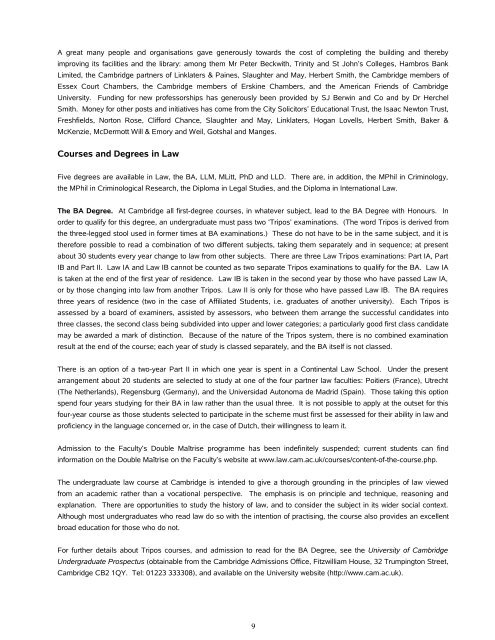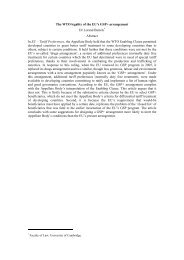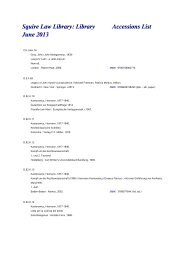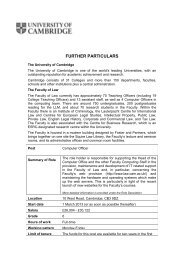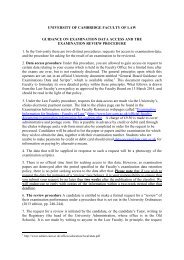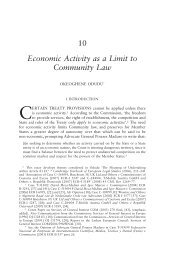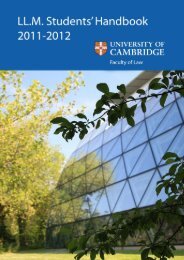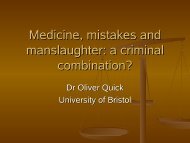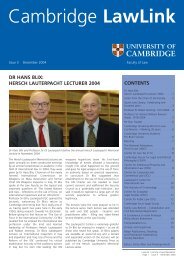The <strong>Faculty</strong> <strong>of</strong> <strong>Law</strong><strong>Law</strong> has been studied and taught in <strong>Cambridge</strong> since the thirteenth century, when the core subjects <strong>of</strong> legal study in allEuropean universities were Civil law (the law <strong>of</strong> ancient Rome) and the Canon law <strong>of</strong> the Church. Early graduates <strong>of</strong> the<strong>Cambridge</strong> <strong>Faculty</strong> <strong>of</strong> Canon <strong>Law</strong> held the highest judicial positions in Europe - in the Rota at Avignon - and two <strong>of</strong> them(William Bateman and Thomas Fastolf) wrote the first known law reports in the ius commune tradition. The principalcommentator on medieval English Canon law, William Lyndwood, was another graduate <strong>of</strong> the <strong>Faculty</strong>. The <strong>Faculty</strong> <strong>of</strong>Canon <strong>Law</strong> was closed by King Henry VIII in 1535, but the <strong>Faculty</strong> received some compensation when the same kingappointed the first Regius Pr<strong>of</strong>essor <strong>of</strong> Civil <strong>Law</strong> in about 1540. Academical legal learning was cosmopolitan; <strong>Cambridge</strong>doctors <strong>of</strong> law practised in the ecclesiastical and admiralty courts, assisted the nation in foreign embassies, anddiscoursed on law, justice and government in philosophical and comparative terms. Here lay the roots <strong>of</strong> the <strong>Faculty</strong>’slong-standing tradition <strong>of</strong> excellence in international and comparative law, jurisprudence and legal history.English law was added to the curriculum in 1800, with the foundation <strong>of</strong> the Downing Pr<strong>of</strong>essorship <strong>of</strong> the <strong>Law</strong>s <strong>of</strong>England. Examinations in law for the BA Degree began in 1858, and the <strong>Faculty</strong> has grown steadily since then in sizeand in the range <strong>of</strong> its interests. The other established chairs in the <strong>Faculty</strong> are: the Whewell (International <strong>Law</strong>, 1867),the Rouse Ball (English <strong>Law</strong>, 1927), the Wolfson (Criminology, 1959), the Arthur Goodhart Visiting Pr<strong>of</strong>essorship (1971),the Pr<strong>of</strong>essorship <strong>of</strong> <strong>Law</strong> (1973) the S.J. Berwin (Corporate <strong>Law</strong>, 1991), the Pr<strong>of</strong>essorship <strong>of</strong> <strong>Law</strong> (1992), the HerchelSmith (Intellectual Property <strong>Law</strong>, 1993), and the Pr<strong>of</strong>essorship <strong>of</strong> European <strong>Law</strong> (1994).Among benefactions received by the <strong>Faculty</strong> to support study and research have been the Whewell Trust Fund (1867),for scholarships in international law; Edmund Yorke’s bequest (1873), used for the Yorke Prize and other undertakingsconnected with the study <strong>of</strong> law; the Maitland Memorial Fund (1906), established in honour <strong>of</strong> F.W. Maitland, DowningPr<strong>of</strong>essor and renowned legal historian, for the promotion <strong>of</strong> research and instruction in the history <strong>of</strong> law and <strong>of</strong> legallanguage and institutions; the Squire Scholarship Fund, received from the trustees <strong>of</strong> Miss Rebecca Flower Squire in1901 to provide scholarships and grants in law; the Wright Rogers bequest (1966), for scholarships and grants; theHersch Lauterpacht Fund (1967), for the study <strong>of</strong> international law; and a number <strong>of</strong> prize funds. Further generoussupport was provided in connection with the new building (below).There are at present 24 pr<strong>of</strong>essors, 7 readers, and over 70 other <strong>University</strong>, <strong>Faculty</strong> and College Teaching Officers.They include specialists in almost every aspect <strong>of</strong> English law and its history, the laws <strong>of</strong> other countries (especiallyEuropean), European Community law, public and private international law, Roman law, legal philosophy, and criminology.A list <strong>of</strong> teaching members, with their principal research interests, is given at p.117, below.At any one time around 6% <strong>of</strong> <strong>Cambridge</strong> undergraduates are reading law. The student body comprises about 700undergraduate and 250 graduate students. Graduates from the <strong>Faculty</strong> are prominent in academic life, in the judiciary,and in both branches <strong>of</strong> the legal pr<strong>of</strong>ession. <strong>Cambridge</strong> judicial alumni include two former Presidents as well as fourcurrent members <strong>of</strong> the International Court <strong>of</strong> Justice, two former judges <strong>of</strong> the European Court <strong>of</strong> Justice, and severalmembers <strong>of</strong> the Court <strong>of</strong> Appeal, and the Supreme Court <strong>of</strong> the United Kingdom.Developments. The <strong>Law</strong> <strong>Faculty</strong> building in West Road, designed by Lord Foster and Partners, and opened in 1995,brings together on one site the Squire <strong>Law</strong> Library, the <strong>Faculty</strong>’s lecture and seminar rooms, the administrative <strong>of</strong>fices,and common-room facilities. It doubled the shelf capacity <strong>of</strong> the library, increased the space for readers and provides afocus for <strong>Faculty</strong> activities, such as formal meetings, informal gatherings, and moots. A new building for the Institute <strong>of</strong>Criminology was operational for the first time during the 2004-2005 academical year.8
A great many people and organisations gave generously towards the cost <strong>of</strong> completing the building and therebyimproving its facilities and the library: among them Mr Peter Beckwith, Trinity and St John’s Colleges, Hambros BankLimited, the <strong>Cambridge</strong> partners <strong>of</strong> Linklaters & Paines, Slaughter and May, Herbert Smith, the <strong>Cambridge</strong> members <strong>of</strong>Essex Court Chambers, the <strong>Cambridge</strong> members <strong>of</strong> Erskine Chambers, and the American Friends <strong>of</strong> <strong>Cambridge</strong><strong>University</strong>. Funding for new pr<strong>of</strong>essorships has generously been provided by SJ Berwin and Co and by Dr HerchelSmith. Money for other posts and initiatives has come from the City Solicitors’ Educational Trust, the Isaac Newton Trust,Freshfields, Norton Rose, Clifford Chance, Slaughter and May, Linklaters, Hogan Lovells, Herbert Smith, Baker &McKenzie, McDermott Will & Emory and Weil, Gotshal and Manges.Courses and Degrees in <strong>Law</strong>Five degrees are available in <strong>Law</strong>, the BA, LLM, MLitt, PhD and LLD. There are, in addition, the MPhil in Criminology,the MPhil in Criminological Research, the Diploma in Legal Studies, and the Diploma in International <strong>Law</strong>.The BA Degree. At <strong>Cambridge</strong> all first-degree courses, in whatever subject, lead to the BA Degree with Honours. Inorder to qualify for this degree, an undergraduate must pass two ‘Tripos’ examinations. (The word Tripos is derived fromthe three-legged stool used in former times at BA examinations.) These do not have to be in the same subject, and it istherefore possible to read a combination <strong>of</strong> two different subjects, taking them separately and in sequence; at presentabout 30 students every year change to law from other subjects. There are three <strong>Law</strong> Tripos examinations: Part IA, PartIB and Part II. <strong>Law</strong> IA and <strong>Law</strong> IB cannot be counted as two separate Tripos examinations to qualify for the BA. <strong>Law</strong> IAis taken at the end <strong>of</strong> the first year <strong>of</strong> residence. <strong>Law</strong> IB is taken in the second year by those who have passed <strong>Law</strong> IA,or by those changing into law from another Tripos. <strong>Law</strong> II is only for those who have passed <strong>Law</strong> IB. The BA requiresthree years <strong>of</strong> residence (two in the case <strong>of</strong> Affiliated Students, i.e. graduates <strong>of</strong> another university). Each Tripos isassessed by a board <strong>of</strong> examiners, assisted by assessors, who between them arrange the successful candidates intothree classes, the second class being subdivided into upper and lower categories; a particularly good first class candidatemay be awarded a mark <strong>of</strong> distinction. Because <strong>of</strong> the nature <strong>of</strong> the Tripos system, there is no combined examinationresult at the end <strong>of</strong> the course; each year <strong>of</strong> study is classed separately, and the BA itself is not classed.There is an option <strong>of</strong> a two-year Part II in which one year is spent in a Continental <strong>Law</strong> School. Under the presentarrangement about 20 students are selected to study at one <strong>of</strong> the four partner law faculties: Poitiers (France), Utrecht(The Netherlands), Regensburg (Germany), and the Universidad Autonoma de Madrid (Spain). Those taking this optionspend four years studying for their BA in law rather than the usual three. It is not possible to apply at the outset for thisfour-year course as those students selected to participate in the scheme must first be assessed for their ability in law andpr<strong>of</strong>iciency in the language concerned or, in the case <strong>of</strong> Dutch, their willingness to learn it.Admission to the <strong>Faculty</strong>’s Double Maîtrise programme has been indefinitely suspended; current students can findinformation on the Double Maîtrise on the <strong>Faculty</strong>’s website at www.law.cam.ac.uk/courses/content-<strong>of</strong>-the-course.php.The undergraduate law course at <strong>Cambridge</strong> is intended to give a thorough grounding in the principles <strong>of</strong> law viewedfrom an academic rather than a vocational perspective. The emphasis is on principle and technique, reasoning andexplanation. There are opportunities to study the history <strong>of</strong> law, and to consider the subject in its wider social context.Although most undergraduates who read law do so with the intention <strong>of</strong> practising, the course also provides an excellentbroad education for those who do not.For further details about Tripos courses, and admission to read for the BA Degree, see the <strong>University</strong> <strong>of</strong> <strong>Cambridge</strong>Undergraduate Prospectus (obtainable from the <strong>Cambridge</strong> Admissions Office, Fitzwilliam House, 32 Trumpington Street,<strong>Cambridge</strong> CB2 1QY. Tel: 01223 333308), and available on the <strong>University</strong> website (http://www.cam.ac.uk).9
- Page 2 and 3: ContentsGeneral InformationOfficers
- Page 4 and 5: Settlement of International Dispute
- Page 6 and 7: Faculty AdministrationFaculty Offic
- Page 10 and 11: The LLM Degree. This degree is awar
- Page 12 and 13: Opening Hours:Full Term: Monday to
- Page 14 and 15: Rules Made by the Information Strat
- Page 16 and 17: The Lauterpacht Centre for Internat
- Page 18 and 19: Centre for Corporate and Commercial
- Page 20 and 21: Cambridge Socio-Legal GroupThe Camb
- Page 26 and 27: Dates of Faculty Board Meetings7 Oc
- Page 28 and 29: Proceed with caution in reaching fo
- Page 30 and 31: Faculty CommunicationEach year, the
- Page 32 and 33: Law Tripos Part IA. A candidate for
- Page 34 and 35: Prizes. The following prizes may be
- Page 36 and 37: PAPER 2. CONSTITUTIONAL LAWA. The a
- Page 38 and 39: Oliver, Constitutional Reform (2003
- Page 40 and 41: Hedley, Tort (6th ed 2008)Weir, An
- Page 42 and 43: 3. Trusts and co-ownership: Concurr
- Page 44 and 45: Brownlie, Principles of Internation
- Page 46 and 47: Elliott, Constitutional Foundations
- Page 48 and 49: Contract: covenant and debt; assump
- Page 50 and 51: Statutes:Blackstone’s Statutes on
- Page 52 and 53: For reference:Birks and Pretto (ed)
- Page 54 and 55: Foster, EU Legislation (2010-2011)B
- Page 56 and 57: PAPER 42. INTELLECTUAL PROPERTY1. I
- Page 58 and 59:
2. Property torts (conversion and t
- Page 60 and 61:
(iii)Causation4. Contracts in Engla
- Page 62 and 63:
Rawls, Political LiberalismRawls, J
- Page 64 and 65:
Rodger and McCulloch, The UK Compet
- Page 66 and 67:
Law Commission, Renting Homes: The
- Page 68 and 69:
Human Rights Case DigestHuman Right
- Page 70 and 71:
3. Title at common law and in equit
- Page 72 and 73:
Exemption from Professional Examina
- Page 74 and 75:
Paper application available to down
- Page 76 and 77:
Form of Examination and Designation
- Page 78 and 79:
‘Open Book’ Papers. Where a pap
- Page 80 and 81:
LLM : Syllabuses and Lists of Recom
- Page 82 and 83:
ased upon one or two leading cases,
- Page 84 and 85:
Goff and Jones, The Law of Restitut
- Page 86 and 87:
Butterworths’ Company Law Handboo
- Page 88 and 89:
2. The EU’s system for human righ
- Page 90 and 91:
the context of environmental protec
- Page 92 and 93:
European Competition Law Review (EC
- Page 94 and 95:
Crawford, The Treatment of Combatan
- Page 96 and 97:
Douglas, The International Law of I
- Page 98 and 99:
Unger, Free Trade Reimagined (2007)
- Page 100 and 101:
3. Sceptics and Critics I4. Sceptic
- Page 102 and 103:
The course provides an opportunity
- Page 104 and 105:
(iv)(v)(vi)(vii)Is either utilitari
- Page 106 and 107:
Reiman, ‘Justice, Civilization, a
- Page 108 and 109:
Gardner, Introduction to the Law of
- Page 110 and 111:
1. Types of theoretical analysis an
- Page 112 and 113:
2. Specific fieldsTopics to be sele
- Page 114 and 115:
The LLM (one-year taught postgradua
- Page 116 and 117:
As part of the requirements for the
- Page 118 and 119:
Teaching Members of the Faculty of
- Page 120 and 121:
MC Elliott, MA, PhD (Cantab); St Ca
- Page 122 and 123:
RA Melikan, BA (Mich), JD, MA (Chi)
- Page 124 and 125:
BD Sloan, MA, LLM (Cantab); King’
- Page 126 and 127:
Law Teachers in the Department of L
- Page 128 and 129:
Murray Edwards College. Dr S Turenn


